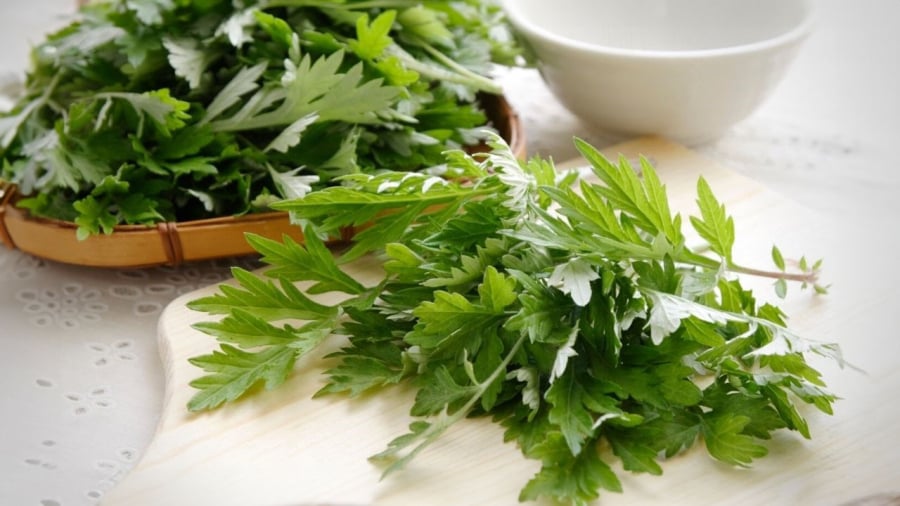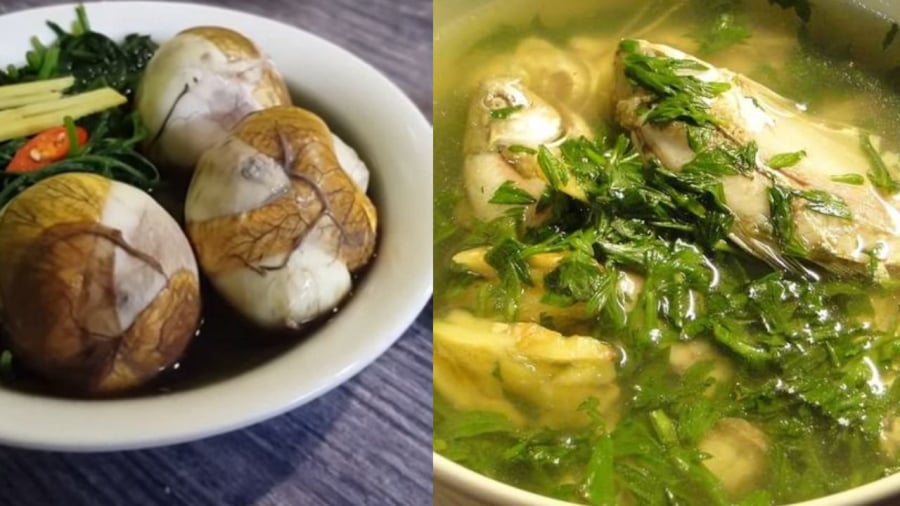Artemisia vulgaris, commonly known as mugwort, is a familiar herb to many Vietnamese families. Easy to grow and resilient, mugwort has a distinctive aroma, a slightly bitter taste, and warming properties. According to Traditional Chinese Medicine, it enters the spleen, liver, and kidney meridians. With its myriad health benefits, mugwort is likened to the king of herbs, serving as both a culinary ingredient and a precious medicinal herb in traditional medicine.
Mugwort – A Humble Yet Nutritious Ingredient, Transformed into Delicious Dishes
Mugwort can be prepared in a variety of ways in daily meals, depending on the region. Some of the most popular dishes include fried eggs with mugwort, chicken soup with mugwort, and pond fish soup with mugwort. More extravagant dishes such as black bone chicken stewed with mugwort are also commonly enjoyed. These dishes are not only delicious but also highly nourishing. Mugwort easily complements other foods, enhancing their flavor while providing nutritional and medicinal value.

The Composition and Medicinal Properties of Mugwort
According to scientific research, mugwort contains approximately 0.20-0.34% essential oil, including prominent compounds such as monoterpenes, dehydromatricaria ester, tricosanol, aracholalcol, and sesquiterpenes. These compounds exhibit anti-inflammatory, hemostatic, antioxidant, and blood-regulating properties, aiding in the improvement of various common health conditions.
What Are the Benefits of Eating Mugwort?
1. Digestive Support and Bile Stimulation: One of mugwort’s standout benefits is its positive impact on digestion. By promoting bile secretion and enhancing liver function, mugwort alleviates symptoms like bloating, abdominal distension, indigestion, and constipation. Pond fish soup with mugwort is a well-known folk remedy for liver detoxification and improved digestion.
2. Menstrual Regulation: For women with irregular or painful periods, mugwort is a familiar savior. Dried mugwort leaves can be brewed like tea and consumed daily to warm the uterus, balance hormones, and support reproductive health. This tea is also beneficial for those who often experience cold hands and feet.

3. Cold Relief and Skin Enhancement: Mugwort’s warming nature helps dispel cold, improve blood circulation, and treat ailments like colds, coughs, and headaches. Soaking your feet or taking a bath in mugwort-infused water relaxes the body and improves blood flow. Additionally, mugwort water can be used as a facial cleanser to reduce acne and promote a rosy complexion.
4. Relief from Bone and Joint Pain: Many postpartum women experience back pain and knee weakness due to wind-cold. Bathing or foot soaking in water boiled with mugwort and ginger relieves pain, warms the body, and improves blood circulation. This folk remedy is also suitable for elderly individuals suffering from joint pain.
5. Dandruff Control, Scalp Health, and Improved Sleep: Washing your hair with mugwort-infused water is a traditional method to alleviate itchy scalp, reduce dandruff, and calm the nerves. With regular use, two to three times a week, you’ll notice improved hair volume and better sleep quality due to enhanced blood circulation.
6. Treatment of Foot Fungus and Edema Reduction: Mugwort water, with its antibacterial and anti-inflammatory properties, can be used to soak feet to treat foot fungus, reduce foot odor, and alleviate edema. Soaking your feet in warm mugwort water every night is also an effective way to prevent skin diseases.
7. Hemostasis and Wound Healing: In traditional medicine, crushed mugwort is applied to minor wounds to stop bleeding. It is also used internally in cases of bleeding, such as vomiting blood or bloody stools, thanks to its natural astringent and anti-inflammatory properties.
8. Treatment of Physical Debility: Mugwort is a nourishing tonic for individuals recovering from illness, experiencing loss of appetite, or suffering from fatigue. Black bone chicken stewed with mugwort, lotus seeds, and jujubes is a dish that replenishes qi and blood while improving overall health. Additionally, pond fish soup with mugwort is a popular choice for enhancing general well-being.
9. Blood Circulation Improvement and Relief from Dizziness: For individuals with vestibular disorders who experience dizziness and vertigo, consuming fried eggs with mugwort or drinking mugwort tea can help improve blood circulation and increase blood flow to the brain.
Precautions When Using Mugwort
While mugwort offers numerous benefits, it is essential to use it in appropriate amounts and at the right times. For mugwort tea, it is recommended to use only 3-5g of dried mugwort (or 9-15g of fresh mugwort) per serving. Prolonged continuous use may lead to adverse effects.
Certain individuals should refrain from consuming mugwort, including:
Pregnant women in their first trimester
Individuals with liver or kidney diseases
People with acute digestive disorders
Additionally, it is advisable to vary the methods of preparing mugwort to avoid overconsumption of fried eggs with mugwort, as frequent egg consumption may impact cholesterol levels. Instead, you can incorporate mugwort into minced meat soups, chicken bone broths, or hot pots.
Unveiling the Ultimate Superfood: The Vietnamese Green, Pricier than Meat and as Potent as Ginseng
This rare and exotic vegetable was once considered a delicacy fit only for royalty. Not only is it delectable, but it also boasts an exceptional nutritional profile, rivaling that of ginseng. Despite its extraordinary qualities, it remains relatively unknown, with few people aware of its existence and even fewer incorporating it into their diets.
Wild Purslane: This Weed-like Vegetable is a Nutritional Powerhouse and a Modern Delicacy
Introducing the humble purslane, a powerhouse of nutrition and an affordable superfood. This unassuming vegetable, often overlooked in the market, is a treasure trove of health benefits. With its vibrant green leaves and delicate stems, purslane is a versatile ingredient that elevates any dish. Don’t walk past this humble vegetable; instead, embrace its goodness and unlock a world of culinary delights and nutritional benefits.





































